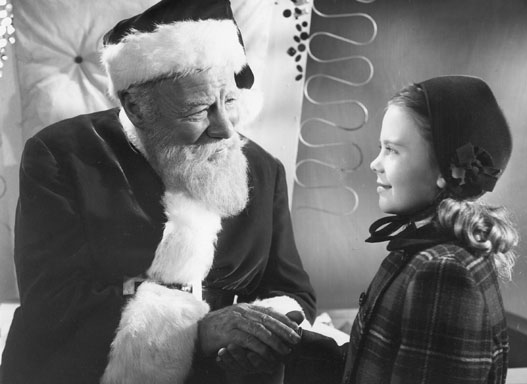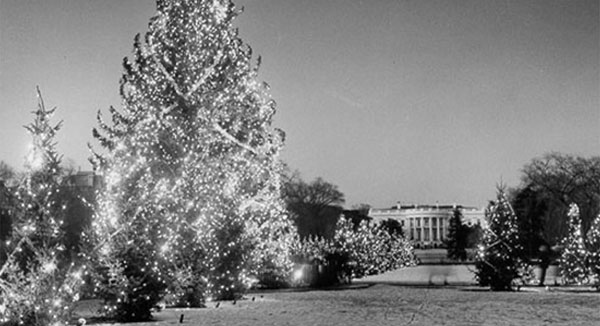As we viewed the National Christmas Tree on the Ellipse in Washington, DC, on a chilly evening several years ago, we saw a crèche display among the Christmas trees from the states and territories. The live animals characteristic of previous years were missing, but there was no mistaking the figures of Mary, Joseph and the Baby Jesus.
My wife was shocked. “How can they do that?” she asked. “Won’t Mr. Bush have trouble with the ACLU?” I replied that Mr. Bush probably wasn’t worried about the ACLU for at least two reasons:
(1) The courts – the ACLU’s primary tool – have no jurisdiction over the Executive Branch;
(2) The ACLU sues only levels of government too poor to pay the legal costs of a lawsuit.
In January 2005, a publicity hound named Michael Newdow sued in federal court to stop prayer from being offered at the presidential inauguration ceremony. (The ACLU was not involved.) Newdow charged that the prayer violated “separation of church and state.” The country held its breath until Supreme Court Chief Justice Rehnquist dismissed the suit without comment.
I doubt if Mr. Bush and his legal staff were holding their breath because they knew (or should know) that the Supreme Court has no jurisdiction over what the Executive and Legislative Branches choose to do about prayer, in particular, or the conduct of their business, in general.
Likewise, Congress can declaim and legislate about the Supreme Court or the president until they are blue all over, but those branches can ignore what Congress says or does, except as the Constitution specifies. This is called “separation of powers,” and is one of our most important founding doctrines. Historically, violation of it has led to Constitutional crises of the first water.
“Separation” means the president can put a crèche (live or otherwise) on the Ellipse, erect a statue of Buddha on the White House lawn, and have Kwanza-karols sung in the Blue Room, but no court-order can stop it. Some constituents might object, but it is not a legal matter.
What some have called “The War on Christmas” is mostly a scare-campaign of threatened action conducted by today’s 800-pound legal gorilla, the American Civil Liberties Union. Alert to any appearance of red and green construction paper in public school classrooms, the ACLU has threatened hundreds of school districts with legal action unless they purge every trace of the Christian Holiday from their schoolhouses. In recent years, the ACLU has widened their “crusade” to include erasure of all Christian expressions in the public square.
Small school districts and towns can’t afford to fight the rich, powerful ACLU in the courts over Yule displays and activities. Officials figure this will have to be someone else’s fight, so one after another they cave without a struggle. Thus, expressions of our nation’s Christian heritage has steadily disappeared from schools and from the public squares of many towns. The War on Christmas, in particular, is a war of legal fees where the richest player usually wins. (Is this a great country, or what?)
Among the many anecdotes that have arisen in recent years:
- Illinois state government workers are forbidden to say “Merry Christmas” at work;
- In Rhode Island, local officials banned Christians from participating in a public project to decorate the lawn of City Hall;
- A New Jersey school banned even instrumental versions of traditional Christmas carols.
- Arizona school officials declared that it is “unconstitutional” for a student to mention the religious history of Christmas in a class project.
Unless something stops it, the ACLU’s vision of a secularized America will be realized in a few years. The nation’s religious foundations and cultural traditions will be only memories held by a few doddering oldsters, like Yours Truly. (And we won’t be around much longer.) Christianity won’t be a part of our culture passed on to children through their schools and communities.
A small slice of the American public welcomes cultural secularization, but most people are upset by it. Many feel that their country’s identity is being stolen – that their connection with the past and their freedom to live as they wish are being diminished. Legislatures make laws, but the courts often strike them down. What, if anything, can be done?
Our Founders called the judiciary the weakest branch. If that’s true, then how did the courts become so powerful? We clearly gave courts too much power by uncritically enforcing their rulings, but the current impression that the courts are omnipotent is an illusion. The Founders knew the courts have only as much power as the people choose to give them. The people, not robed justices, are the final authority.
In fact, the people have curtailed court power on some occasions. Excluded from America’s social and economic mainstream for centuries, African-Americans rose up in the 1950s and ‘60s to defy an edifice of laws and court rulings that disadvantaged dark-skinned people.
Heroes of the Civil Rights movement, like Rosa Parks and Martin Luther King, Jr. performed public acts that gave the cause visibility and moral gravity. Millions of Americans who thought segregated schools and whites-only lunch-counters had nothing to do with them saw that the entire system of racial segregation was unfair and absolutely un-American.
Years later, with the 1960s receding in the rear-view mirror, it’s easy to forget that the civil rights movement was really about massive disobedience of racial conventions, laws, regulations, and court rulings. Dr. King insisted on “non-violence,” but in the best 1776 tradition, blacks disobeyed bad laws and legal rulings to establish true justice.
Many ordinary people and some highly visible leaders went to jail for doing this. Their “law-breaking” offended some, but it’s important to remember that not all law is just. Free people have a duty to overturn immoral laws. (Keep that in mind the next time you hear someone speak of the law as though it were holy writ.)
Dr. King’s famous “Letter from a Birmingham Jail”1 brought moral outrage to the battle against segregation. His involvement ultimately cost him his life. Ditto for Medgar Evers and many others. But the ideas they contended for were too powerful to be killed by mere bullets. Legally enforced racism finally collapsed because Americans would not countenance it. They resisted and defeated the courts on this issue.

Dorothy traveled to Oz, seeking the power to get back to Kansas. But all along she had that power in the Ruby Slippers. The power we don’t realize we have – our Ruby Slippers – is our ability to resist bad law. Civil disobedience in defense of Christianity – including Christmas – might have a cost, but I believe it will be minimal. It could work like this:
- The ACLU demands that a school district eliminate all Christmas symbols and activities, or face legal action.
- The district’s superintendent, Dr. Smith, takes no action and skips the court proceedings.
- The court finds for the ACLU, but Dr. Smith ignores the ruling.
- In a news conference, Dr. Smith states the district’s position, noting that – (a) Christmas is an important part of the nation’s heritage; (b) Teaching this fact enhances students’ education and harms no one; (c) The school district refuses to waste taxpayers’ funds on frivolous lawsuits; (d) The ACLU appears to lack standing as a “harmed party.”
- When the sheriff arrives to cite Dr. Smith for contempt of court, reporters record the arrest and publicize it on TV and in print media.
- Students organize a Christmas Eve protest and sing Christmas Carols outside the city jail and the court.
- Dr. Smith’s “Christmas Letter from the City Jail” is published nationwide.
- Focus on the Family, Fox News, Newsweek and other national organs broadcast interviews from his cell.
- The ACLU asks the court to release Dr. Smith on First Amendment grounds.
- He returns home to a tumultuous welcome, founds a national organization to combat anti-Christian discrimination, and is nominated for the Nobel Peace Prize. (OK, the Nobel is a stretch.)
- Other school districts follow Dr. Smith’s example. The War on Christmas dies out.
Civil disobedience to defend Christianity could cause school administrators, teachers or other public officials to lose employment, but that result seems unlikely. Indeed, the idea of jailing officials who defend Christmas evokes the absurd proceedings in the classic film Miracle on 34thStreet. When Kris Kringle’s sanity is put on trial, the judge’s political manager warns him that he can kiss his political future good-bye if he puts Santa Claus in the nuthouse.
Something like this dynamic would be in play if officials were jailed for ignoring ACLU lawsuits. Show me a sheriff willing to arrest a school superintendent for not kicking Christianity out of his schools, and I’ll show you a sheriff who wants to retire.
James Madison was right. The courts are the weakest branch. The people are far stronger. We just need to realize it. When we click those ruby slippers, the War on Christianity will go “poof.”
*********
- Dr. King’s “Letter from a Birmingham Jail:” https://www.csuchico.edu/iege/_assets/documents/susi-letter-from-birmingham-jail.pdf


